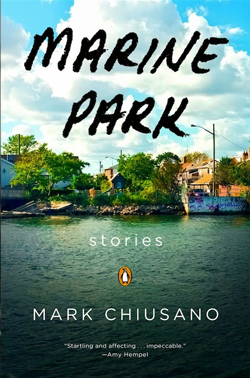Marine Park
by Mark Chiusano
reviewed by Ophelia John
Marine Park is eleven avenues long (if you count generously) and seventeen short blocks wide, and Mark Chiusano is its storyteller, animating this former “two-fare zone” neighborhood on the outer edge of Brooklyn: it takes a bus fare plus the Q train to get into “the city.”
Central to this collection of linked short stories and interconnected characters are two brothers, Lorris and Jamison Favero. The “Lorris stories” are largely narrated by Jamison, the elder (who is sometimes only identified as being the brother of Lorris), speaking in the first person singular. The non-Lorris stories cover a narratorial range from first person and the more traditional third person to other rare and difficult points of view: the third person plural (“we did”) and second person (“you did”). In pulling this off, Chiusano displays his technical chops and contemporary bent.
But that’s not all: these are stories intelligent in form and subtext, stories that acknowledge their debt to other twentieth-century voices. A voice reminiscent of Holden Caulfield comes through in “Attached” (one of the collection’s best) when Jamison says, “People are always giving people useless things for their birthdays. That’s something I can’t abide.” In this story, Jamison and Lorris break into an old house, once part of the Underground Railroad, now owned by the Parks Department. But the inner story is Jamison’s slump: he’s dropped out of Brooklyn College and is living with his parents. While Lorris’s life is full of friends and going out at night, Jamison turns down invitations and holds his failures close to his chest. The perceived low emotional temperature of these stories owes something to style and something to the consistent submerging of their emotional content. In place of open emotion, Chiusano uses Raymond Carver-style minimalism, tersely accounting for the physical world: “I wanted to say how much I liked this place. I liked the way the wood felt under my feet. While I put the chairs back in the rack Lorris went out and waited for me by the car.”
In yet another story of emotions that never quite rise to the surface, Jamison is at Brandeis visiting his friend Hayden. “To Live in the Present Moment Is a Miracle” is perhaps the finest story in this collection:
He said it [the cemetery] was absurdly beautiful at night—he used the word beautiful; I don’t think I’d ever heard someone use that word out loud before—and he liked to walk on the gravel path.
We were leaning against a pedestal, TAYMAN, JAMES—1927, off the path, out of the wind. Hayden said, You know, I’ve thought about kissing you, but I don’t think that would make me happy either.
I asked what he meant.
He straightened his back and raised his head, and then he slumped back down lower on the rock.
It sounds a little like something, but that’s not the way it really was in my head, he said.
Away from Marine Park, Hayden has undertaken to live consciously (an aim that is foreign to Chiusano’s other characters), but Jamison reserves judgment, not offering the reader any handy conclusions after his friend’s confession. Jamison simply follows Hayden, who wants to “be spontaneous,” onto the frozen river ice. “The surface was always solid.” Chiusano writes. “The skin on your fingers got dry and white. The ice cracks in the night sounded like conversation.”
This comfort and strain (and oblique communication) with a hint of danger underlies many other stories (“Open Your Eyes,” “Attached,” “Haircut,” “Air Conditioning,” “Ed Monahan’s Game”) where personal interactions express the same needs along the spectrum of words–sports–violence:
He wanted nothing more than a game of basketball. A good one-on-one game, the feel of a body hitting another body, bouncing off, hitting again. Something he hadn’t felt in a while.
Listen, he said vaguely.
You listen, said Ed. Get back in your car, pussy, and get away.
So Andrew hit him.. . . Andrew felt thankful for his haircut, for the cool breeze he felt passing by his neck.
Marine Park as setting and focus conveys not only a sense of family but also what it means to live in a neighborhood. An enclave and a web that is contained but not simple. Chiusano shows how these lives intersect, change, or maintain stasis, allowing the point of view to shift within a single story. In “Palms,” each character relates differently to Martin, a mentally handicapped (“touched”) man, who palms the heads of neighborhood children to “Make you smart.” This is the essence of living in community: “[Amanda’s] father, Rich, felt uncomfortable, but there were some things you had to do,” while the Braiker boy finds Martin’s palmings “comforting,” and wonders, “It might make him smart: who knew.” Chiusano wraps it up by following a windbreaker blowing around the neighborhood in a freak storm as Martin runs into the middle of the street. He disappears into an ambulance and the neighbors never do find out the end of his story. They only know that the neighborhood children grow up just the same without Martin’s palmings.
These subtle, nuanced endings capture the open-ended feel of contemporary fiction perfectly: one knows, but one can never be sure. “Why Don’t You,” the story of Jamison’s adolescent relationship with Natalia, ends when he embraces her and his thoughts turn to Lorris’s childhood collection of sea glass. There is one more thing we do know: Mark Chiusano’s next book is something to look forward to.
Published on September 10, 2015

